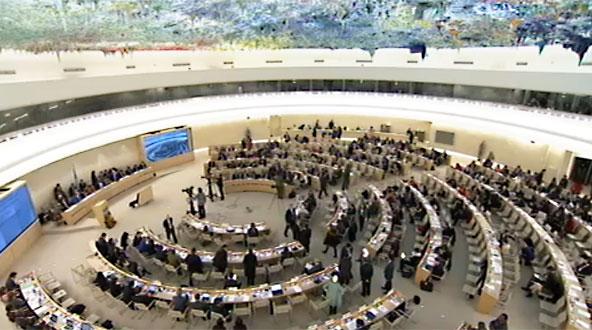| 2022 | Last known execution |
| Hanging | Method(s) of execution |
| No | Party to the International Covenant on Civil and Political Rights |
| No | Party to the Second Optional Protocol to the ICCPR, aiming at the abolition of the death penalty |
| Not applicable | Party to the American Convention on Human Rights |
| Not applicable | Party to the Protocol to the American Convention on Human Rights to Abolish the Death Penalty |
| No | UN Moratorium Resolution (2010): cosponsor |
| Against | UN Moratorium Resolution (2010): vote |
| Yes | UN Moratorium Resolution (2010): has signed the Note Verbale of Dissociation |
| No | UN Moratorium Resolution (2012): cosponsor |
| Against | UN Moratorium Resolution (2012): vote |
| Yes | UN Moratorium Resolution (2012): has signed the Note Verbale of Dissociation |
| Unclear | Does the country have a mandatory death penalty? |
| 2026-02-16 | Last update |
Source: Cornell Center on the Death Penalty Worldwide
*Source of classification: Amnesty International
Related document(s)
Document(s)
The politics of abolition: Reframing the death penalty’s history in comparative perspective
By Carolyn Strange, Daniel Pascoe, and Andrew Novak, on 5 December 2024
2024
Academic Article
Canada
Cruel, Inhuman and Degrading Treatment and Punishment
Mali
Mexico
Myanmar
Philippines
Trend Towards Abolition
United Kingdom
More details See the document
Literature on opposition to the death penalty typically characterizes abolition as inexorable and attributes its fulfillment to the age of human rights. Although most countries abolished capital punishment after the Universal Declaration of Human Rights in 1948, this article uses three comparative case studies to demonstrate abolition’s entanglement with a broader range of political, legal, and cultural factors. Applying a historically grounded nonteleological approach, we offer three insights. First, civilizationist values drove abolitionism in countries in the “vanguard,” such as Canada and England/Wales, where human rights rationales were expressed well after abolition and as a mark of superiority. Second, death penalty abolition has often allied with decolonization and penal reform, but assertions of independence and sovereignty have periodically provoked reinstatement, as in Mexican and Philippine history, which underscores the fragility of abolition. Third, state-centric approaches to de jure and de facto abolition overlook the practice of extrajudicial and summary “rebel” executions in polities such as Myanmar and Mali, which lack a state monopoly on force. Further historical studies that do not presuppose a human rights explanation of abolition and that compare jurisdictions within as well as between the Global North and South will better grasp the death penalty’s complex history.
- Document type Academic Article
- Countries list Canada / Mali / Mexico / Myanmar / Philippines / United Kingdom
- Themes list Cruel, Inhuman and Degrading Treatment and Punishment / Trend Towards Abolition
Document(s)
Note verbale dated 16 April 2013 from the Permanent Mission of Egypt to the United Nations addressed to the Secretary-General
By United Nations, on 8 September 2020
2020
United Nations report
Afghanistan
Antigua and Barbuda
Bahrain
Bangladesh
Barbados
Botswana
Brunei Darussalam
Chad
China
Democratic People's Republic of Korea
Egypt
Equatorial Guinea
Eritrea
Eswatini
Ethiopia
Grenada
Guyana
India
Iran (Islamic Republic of)
Iraq
Jamaica
Kuwait
Lao People's Democratic Republic
Libya
Malaysia
Mauritania
Moratorium
Myanmar
Nigeria
Oman
Pakistan
Papua New Guinea
Qatar
Saint Kitts and Nevis
Saint Lucia
Saint Vincent and the Grenadines
Saudi Arabia
Singapore
Solomon Islands
Somalia
Sudan
Syrian Arab Republic
Tonga
Trinidad and Tobago
Uganda
United Arab Emirates
Yemen
Zimbabwe
aresfrruzh-hantMore details See the document
The permanent missions to the United Nations in New York listed below have the honour to refer to General Assembly resolution 67/176, entitled “Moratorium on the use of the death penalty”, which was adopted by the Third Committee on 19 November 2012, and subsequently by the General Assembly on 20 December 2012 by a recorded vote. The permanent missions wish to place on record that they are in persistent objection to any attempt to impose a moratorium on the use of the death penalty or its abolition in contravention of existing stipulations under international law, for the following reasons:
- Document type United Nations report
- Countries list Afghanistan / Antigua and Barbuda / Bahrain / Bangladesh / Barbados / Botswana / Brunei Darussalam / Chad / China / Democratic People's Republic of Korea / Egypt / Equatorial Guinea / Eritrea / Eswatini / Ethiopia / Grenada / Guyana / India / Iran (Islamic Republic of) / Iraq / Jamaica / Kuwait / Lao People's Democratic Republic / Libya / Malaysia / Mauritania / Myanmar / Nigeria / Oman / Pakistan / Papua New Guinea / Qatar / Saint Kitts and Nevis / Saint Lucia / Saint Vincent and the Grenadines / Saudi Arabia / Singapore / Solomon Islands / Somalia / Sudan / Syrian Arab Republic / Tonga / Trinidad and Tobago / Uganda / United Arab Emirates / Yemen / Zimbabwe
- Themes list Moratorium
- Available languages مذكرة شفوية مؤرخة 16 نيسان/أبريل 2013 موجهة إلى الأمين العام من البعثة الدائمة لمصر لدى الأمم المتحدةNota verbal de fecha 16 de abril de 2013 dirigida al Secretario General por la Misión Permanente de Egipto ante las Naciones UnidasNote verbale datée du 16 avril 2013, adressée au Secrétaire général par la Mission permanente de l’Égypte auprès de l’Organisation des Nations UniesВербальная нота Постоянного представительства Египта при Организации Объединенных Наций от 16 апреля 2013 года на имя Генерального секретаря2013年4月16日埃及常驻联合国代表团给秘书长的普通照会
Document(s)
Note verbale dated 11 March 2011 from the Permanent Mission of Egypt to the United Nations addressed to the Secretary-General
By United Nations, on 8 September 2020
United Nations report
Afghanistan
Antigua and Barbuda
Bahamas
Bahrain
Bangladesh
Barbados
Botswana
Brunei Darussalam
Central African Republic
Chad
China
Democratic People's Republic of Korea
Democratic Republic of the Congo
Dominica
Egypt
Equatorial Guinea
Eritrea
Eswatini
Ethiopia
Grenada
Guinea
Guyana
Indonesia
Iran (Islamic Republic of)
Iraq
Jamaica
Kuwait
Lao People's Democratic Republic
Libya
Malaysia
Moratorium
Myanmar
Niger
Nigeria
Oman
Pakistan
Papua New Guinea
Qatar
Saint Kitts and Nevis
Saint Lucia
Saint Vincent and the Grenadines
Saudi Arabia
Sierra Leone
Singapore
Solomon Islands
Somalia
Sudan
Syrian Arab Republic
Tonga
Trinidad and Tobago
Uganda
United Arab Emirates
Yemen
Zimbabwe
aresfrruzh-hantMore details See the document
The permanent missions to the United Nations in New York listed below have the honour to refer to General Assembly resolution 65/206, entitled “Moratorium on the use of the death penalty”, which was adopted by the Third Committee on 11 November 2010, and subsequently by the General Assembly on 21 December 2010 by a recorded vote. The permanent missions wish to place on record that they are in persistent objection to any attempt to impose a moratorium on the use of the death penalty or its abolition in contravention of existing stipulations under international law, for the following reasons:
- Document type United Nations report
- Countries list Afghanistan / Antigua and Barbuda / Bahamas / Bahrain / Bangladesh / Barbados / Botswana / Brunei Darussalam / Central African Republic / Chad / China / Democratic People's Republic of Korea / Democratic Republic of the Congo / Dominica / Egypt / Equatorial Guinea / Eritrea / Eswatini / Ethiopia / Grenada / Guinea / Guyana / Indonesia / Iran (Islamic Republic of) / Iraq / Jamaica / Kuwait / Lao People's Democratic Republic / Libya / Malaysia / Myanmar / Niger / Nigeria / Oman / Pakistan / Papua New Guinea / Qatar / Saint Kitts and Nevis / Saint Lucia / Saint Vincent and the Grenadines / Saudi Arabia / Sierra Leone / Singapore / Solomon Islands / Somalia / Sudan / Syrian Arab Republic / Tonga / Trinidad and Tobago / Uganda / United Arab Emirates / Yemen / Zimbabwe
- Themes list Moratorium
- Available languages مذكرة شفوية مؤرخة 11 آذار/مارس 2011 موجَّهة إلى الأمين العام من البعثة الدائمة لمصر لدى الأمم المتحدةNota verbal de fecha 11 de marzo de 2011 dirigida al Secretario General por la Misión Permanente de Egipto ante las Naciones UnidasNote verbale datée du 11 mars 2011, adressée au Secrétaire général par la Mission permanente de l’Égypte auprès de l’Organisation des Nations UniesВербальная нота Постоянного представительства Египта при Организации Объединенных Наций от 11 марта 2011 года на имя Генерального секретаря2011年3月11日埃及常驻联合国代表团给秘书长的普通照会
Document(s)
Note verbale dated 10 February 2009 from the Permanent Missions to the United Nations of Afghanistan, the Bahamas, […] and Zimbabwe addressed to the Secretary-General
By United Nations, on 8 September 2020
United Nations report
Afghanistan
Bahamas
Bahrain
Bangladesh
Barbados
Botswana
Brunei Darussalam
Central African Republic
Chad
China
Comoros
Democratic People's Republic of Korea
Dominica
Egypt
Equatorial Guinea
Eritrea
Eswatini
Ethiopia
Fiji
Gambia
Grenada
Guinea
Guyana
Indonesia
Iran (Islamic Republic of)
Iraq
Jamaica
Japan
Jordan
Kuwait
Lao People's Democratic Republic
Libya
Malaysia
Maldives
Mauritania
Mongolia
Moratorium
Myanmar
Niger
Nigeria
Papua New Guinea
Qatar
Saint Kitts and Nevis
Saint Lucia
Saint Vincent and the Grenadines
Saudi Arabia
Singapore
Solomon Islands
Somalia
Sudan
Suriname
Syrian Arab Republic
Thailand
Tonga
Trinidad and Tobago
Uganda
United Arab Emirates
Yemen
Zimbabwe
aresfrruzh-hantMore details See the document
The Permanent Missions to the United Nations in New York listed below present their compliments to the Secretary-General of the United Nations and have the honour to refer to resolution 62/149, entitled “Moratorium on the use of the death penalty”, which was adopted by the Third Committee on 15 November 2007, and subsequently by the General Assembly on 18 December 2007 by a recorded vote. The Permanent Missions wish to place on record that they are in persistent objection to any attempt to impose a moratorium on the use of the death penalty or its abolition in contravention to existing stipulations under international law, for the following reasons:
- Document type United Nations report
- Countries list Afghanistan / Bahamas / Bahrain / Bangladesh / Barbados / Botswana / Brunei Darussalam / Central African Republic / Chad / China / Comoros / Democratic People's Republic of Korea / Dominica / Egypt / Equatorial Guinea / Eritrea / Eswatini / Ethiopia / Fiji / Gambia / Grenada / Guinea / Guyana / Indonesia / Iran (Islamic Republic of) / Iraq / Jamaica / Japan / Jordan / Kuwait / Lao People's Democratic Republic / Libya / Malaysia / Maldives / Mauritania / Mongolia / Myanmar / Niger / Nigeria / Papua New Guinea / Qatar / Saint Kitts and Nevis / Saint Lucia / Saint Vincent and the Grenadines / Saudi Arabia / Singapore / Solomon Islands / Somalia / Sudan / Suriname / Syrian Arab Republic / Thailand / Tonga / Trinidad and Tobago / Uganda / United Arab Emirates / Yemen / Zimbabwe
- Themes list Moratorium
- Available languages مذكرةشفويةمؤرخة١٠شـباط/فبرايـر٢٠٠٩Nota verbal de fecha 10 de febrero de 2009 dirigida al Secretario General por las misiones permanentes ante las Naciones Unidas del Afganistán, la Arabia Saudita, [...] y ZimbabweNote verbale datée du 10 février 2009, adressée au Secrétaire général par les Missions permanentes auprès de l’Organisation des Nations Unies de l’Afghanistan, de l’Arabie saoudite, [...] et du ZimbabweВербальная нота постоянных представительств Афганистана, БагамскихОстровов, […] и Чада при Организации Объединенных Наций от 10 февраля 2009 года на имя Генерального секретаря9年2月10日阿富汗、巴哈马、巴林、[...] 也门和津巴布韦常驻联合国代表团给秘书长的普通照会
Document(s)
Note verbale dated 11 January 2008 from the Permanent Missions to the United Nations of Afghanistan, Antigua and Barbuda, […] and Zimbabwe addressed to the Secretary-General
By United Nations, on 8 September 2020
United Nations report
Afghanistan
Antigua and Barbuda
Bahamas
Bahrain
Bangladesh
Barbados
Botswana
Brunei Darussalam
Central African Republic
China
Comoros
Democratic People's Republic of Korea
Dominica
Egypt
Equatorial Guinea
Eritrea
Eswatini
Ethiopia
Fiji
Grenada
Guinea
Guyana
Indonesia
Iran (Islamic Republic of)
Iraq
Jamaica
Japan
Jordan
Kuwait
Lao People's Democratic Republic
Libya
Malaysia
Maldives
Mauritania
Mongolia
Moratorium
Myanmar
Nigeria
Oman
Pakistan
Papua New Guinea
Qatar
Saint Kitts and Nevis
Saint Lucia
Saint Vincent and the Grenadines
Saudi Arabia
Singapore
Solomon Islands
Somalia
Sudan
Suriname
Syrian Arab Republic
Thailand
Tonga
Trinidad and Tobago
Uganda
United Arab Emirates
Yemen
Zimbabwe
aresfrruzh-hantMore details See the document
The Permanent Missions to the United Nations in New York listed below present their compliments to the Secretary-General of the United Nations and have the honour to refer to resolution 62/149, entitled “Moratorium on the use of the death penalty”, which was adopted by the Third Committee on 15 November 2007, and subsequently by the General Assembly on 18 December 2007 by a recorded vote. The Permanent Missions wish to place on record that they are in persistent objection to any attempt to impose a moratorium on the use of the death penalty or its abolition in contravention to existing stipulations under international law, for the following reasons:
- Document type United Nations report
- Countries list Afghanistan / Antigua and Barbuda / Bahamas / Bahrain / Bangladesh / Barbados / Botswana / Brunei Darussalam / Central African Republic / China / Comoros / Democratic People's Republic of Korea / Dominica / Egypt / Equatorial Guinea / Eritrea / Eswatini / Ethiopia / Fiji / Grenada / Guinea / Guyana / Indonesia / Iran (Islamic Republic of) / Iraq / Jamaica / Japan / Jordan / Kuwait / Lao People's Democratic Republic / Libya / Malaysia / Maldives / Mauritania / Mongolia / Myanmar / Nigeria / Oman / Pakistan / Papua New Guinea / Qatar / Saint Kitts and Nevis / Saint Lucia / Saint Vincent and the Grenadines / Saudi Arabia / Singapore / Solomon Islands / Somalia / Sudan / Suriname / Syrian Arab Republic / Thailand / Tonga / Trinidad and Tobago / Uganda / United Arab Emirates / Yemen / Zimbabwe
- Themes list Moratorium
- Available languages مؤرخــةشــفويةمــذكرة11الثــانيكــانون/ينــاير2008Nota verbal de fecha 11 de enero de 2008 dirigida al Secretario General por las Misiones Permanentes ante las Naciones Unidas del Afganistán, Antigua y Barbuda, [...] y Zimbabwe ante las Naciones UnidasNote verbale datée du 11 janvier 2008, adressée au Secrétaire général par les missions permanentes auprès de l’Organisation des Nations Unies de l’Afghanistan, d’Antigua-et-Barbuda, [...] et du ZimbabweВербальная нота Постоянных представительств Антигуа и Барбуды, Афганистана, […] и Японии при Организации Объединенных Наций от 11 января 2008 года на имя Генерального секретаря普通照会2007
Document(s)
Myanmar: The Administration Of Justice – Grave And Abiding Concerns
By Amnesty International, on 8 September 2020
NGO report
Myanmar
More details See the document
This report discusses Amnesty International’s concern about political imprisonments in Myanmar. Arbitrary arrests; torture and ill-treatment during incommunicado detention; unfair trials; and laws which greatly curtail the rights to freedom of expression and assembly continue as major obstacles to the improvement in the State Peace and Development Council’s human rights record. The section dedicated to the death penalty talks about the death penalty system in relation to specific cases.
- Document type NGO report
- Countries list Myanmar
- Themes list Country/Regional profiles,





